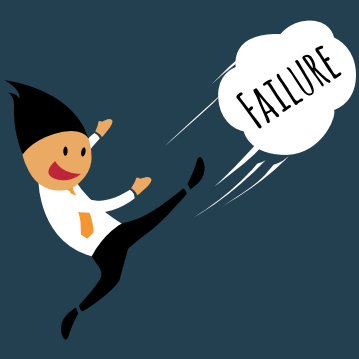February 2021
Helena Jones explains how to deal with failure.
Results day. All the build-up, the nerves, the hope, only to find that
you have failed to pass your exam. Depending on which exam you
took, you might not want to see another MCQ for as long as you
live, but here’s one for fun:
You have failed your exam. What do you do now?
A: Give up
B: Seethe with resentment
C: Draw up a strategy for your next, successful, attempt
The correct answer, of course, is C.
A is incorrect because you are made of sterner stuff.
B is understandable but ultimately pointless.
So, what should this strategy be? It is tempting to put everything behind you and start afresh, but that would mean forgetting all you have learned from your studies and also from the experience of sitting the exam.
When you reach a moment of calm, think about jotting down your thoughts under two headings. Here are some ideas to get you started:
| What went wrong? | What went right? |
|---|---|
Try not to dwell too much on this, but when you do identify something that went wrong, turn it into a positive that you can use for your strategy. For example: “I was tired and couldn’t concentrate” could be turned into: “I will be well-prepared and organised on the day before the exam so that I can relax, sleep well and feel refreshed on the day.” | It might not feel that way soon after the exam results, but there will be some positive things to take forward. For example: • I now have experience of sitting an exam in this paper. • I will know what to expect next time. • I got some marks! |
Now is a good time to look at any feedback, such as the examiner’s report, for the exam that you attempted. There are often some recurring themes in examiner’s comments:
• Not reading the question properly.
• Answering a different question from the one being asked (see above).
• Poor time management.
• Lack of preparation.
• Failing to gain the easy marks (where applicable).
There is a reason why examiners repeat the same failings in
report after report: many candidates in each sitting fall short of these
fundamental requirements for exam success. Don’t be one of those
candidates who repeats the same mistakes.
One thing you must consider as part of your strategy is to attempt
as many mocks as you can. As any tutor will tell you, students who
attempt mocks tend to do well in the real exam, and we all kind of know this anecdotally.
Recently, however, we received some real analysis from a client that showed something truly startling: the more mocks a student took, the higher the pass rate. Students who attempted three or more mocks before taking the real exam had a pass rate of 90%; for students who did not attempt a mock the pass rate was 50%.
Now that should definitely be part of your strategy: get as much exam practice as possible.
• Helena Jones is a director at Sonar Education.




